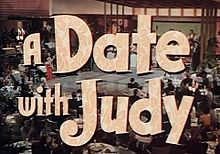Plot
In Santa Barbara, California, teenager Judy Foster (Jane Powell) and her friends are rehearsing songs for their high school dance when the student director of the show, Carol Pringle (Elizabeth Taylor), complains that the songs, as performed, are too "juvenile." Carol, a senior at the school and a renowned snob, demonstrates how the music should be played, and gives the song a more seductive flavor.
Later, Carol tells Judy that famous band leader Xavier Cugat will be the guest of honor at the dance, and urges her to wear her pink dress for the occasion. When Judy learns that her sweetheart, Ogden "Oogie" Pringle (Scotty Beckett), who is Carol's brother, has decided not to take her to the dance, she becomes infuriated and vows to break off her friendship with him. Dejected, Judy visits Pop's Soda Fountain, where she meets Pop's handsome nephew, Stephen Andrews (Robert Stack). Judy falls instantly in love with the older Stephen, and he agrees to take her to the dance as a favor to Pop. At the dance, Oogie sees Judy with Stephen and becomes jealous. While Oogie tries to divert Judy's attention away from Stephen, Stephen meets Carol and believes he has found "the most beautiful girl in Santa Barbara."
After the dance, Carol tries to help Oogie and Judy get back together by telling Judy that she has convinced her wealthy father to give Judy and Oogie a program on his radio station. Meanwhile, Rosita Conchellas (Carmen Miranda), a dance instructor, secretly meets with Judy's father Melvin (Wallace Beery) to teach him the rumba, which he hopes to dance on his wedding anniversary. When Oogie tries to make amends with Judy at a dinner arranged by Carol, a misunderstanding arises that leads to his being further alienated from his sweetheart. Judy, however, shows no signs of a broken heart, and later tells her father that she is in love with Stephen and that she intends to marry him.
When Judy discovers Rosita's skirt caught in the closet door of her father's office, she incorrectly concludes that her father is having an affair. Determined to save her parents' marriage, Judy runs home and gives her mother Dora (Selena Royle) a beauty makeover to make her more appealing to her father. Oogie, in his tireless determination to reunite with Judy, tries to serenade her, but another misunderstanding arises and the plan is spoiled. Judy becomes convinced that her father is planning to leave her mother when she and Carol see him escorting Rosita to his car. Carol and Judy later accuse Rosita of breaking up Judy's home. Rosita misunderstands the accusation and believes that they are talking about Cugat, her fiancé. When Judy and Carol finally realize their mistake, they apologize to Rosita. Judy then reconciles with Oogie after she learns that Carol is in love with Stephen, and Stephen agrees to resume his romance with Carol in a few years, when she is older. [5]

Maria do Carmo Miranda da Cunha, known professionally as Carmen Miranda, was a Portuguese-born Brazilian singer, dancer and actress. Nicknamed "The Brazilian Bombshell", she was known for her signature fruit hat outfit that she wore in her American films. As a young woman, she designed hats in a boutique before making her first recordings with composer Josué de Barros in 1929. Miranda's 1930 recording of "Taí ", written by Joubert de Carvalho, catapulted her to stardom in Brazil as the foremost interpreter of samba.

Wallace Fitzgerald Beery was an American film and stage actor. He is best known for his portrayal of Bill in Min and Bill (1930) opposite Marie Dressler, as General Director Preysing in Grand Hotel (1932), as Long John Silver in Treasure Island (1934), as Pancho Villa in Viva Villa! (1934), and his title role in The Champ (1931), for which he won the Academy Award for Best Actor. Beery appeared in some 250 films during a 36-year career. His contract with Metro-Goldwyn-Mayer stipulated in 1932 that he would be paid $1 more than any other contract player at the studio. This made Beery the highest-paid film actor in the world during the early 1930s. He was the brother of actor Noah Beery and uncle of actor Noah Beery Jr.

María Rosario Pilar Martínez Molina Baeza, professionally known by her stage name Charo, is a Spanish-born actress, singer, comedian, and flamenco guitarist who rose to international prominence in the 1960s on American television, as well as starring in several films.

Jane Powell was an American actress, singer, and dancer who first appeared in Metro-Goldwyn-Mayer musicals in the 1940s and 50s. With her soprano voice and girl-next-door image, Powell appeared in films, television and on the stage, performing in the musicals A Date with Judy (1948), Royal Wedding (1951), Seven Brides for Seven Brothers (1954), and Hit the Deck (1955).

Xavier Cugat was a Spanish musician and bandleader who spent his formative years in Havana, Cuba. A trained violinist and arranger, he was a leading figure in the spread of Latin music. In New York City, he was the leader of the resident orchestra at the Waldorf–Astoria before and after World War II. He was also a cartoonist and a restaurateur. The personal papers of Xavier Cugat are preserved in the Biblioteca de Catalunya.
That's Entertainment! is a 1974 American compilation film released by Metro-Goldwyn-Mayer to celebrate the studio's 50th anniversary. The success of the retrospective prompted a 1976 sequel, the related 1985 film That's Dancing!, and a third installment in 1994.

Scott Hastings Beckett was an American actor. He began his career as a child actor in the Our Gang shorts and later costarred on Rocky Jones, Space Ranger.
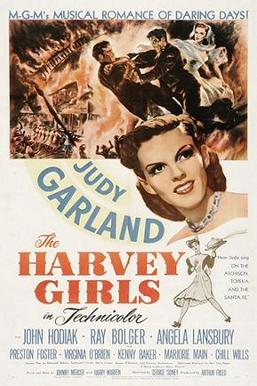
The Harvey Girls is a 1946 Technicolor American musical film produced by Arthur Freed for Metro-Goldwyn-Mayer. It is based on the 1942 novel of the same name by Samuel Hopkins Adams, about Fred Harvey's Harvey House waitresses. Directed by George Sidney, the film stars Judy Garland and features John Hodiak, Ray Bolger, and Angela Lansbury, as well as Preston Foster, Virginia O'Brien, Kenny Baker, Marjorie Main and Chill Wills. Future star Cyd Charisse appears in her first speaking role on film.

A Date with Judy is a comedy radio series aimed at a teenage audience which ran from 1941 to 1950.
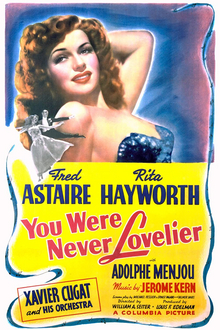
You Were Never Lovelier is a 1942 American musical romantic comedy film directed by William A. Seiter and starring Fred Astaire and Rita Hayworth. The supporting cast also features Adolphe Menjou, Xavier Cugat and Adele Mara. The music was composed by Jerome Kern and the lyrics by Johnny Mercer. The picture was released by Columbia Pictures and includes the elaborate "Shorty George" and romantic "I'm Old Fashioned" song and dance sequences.
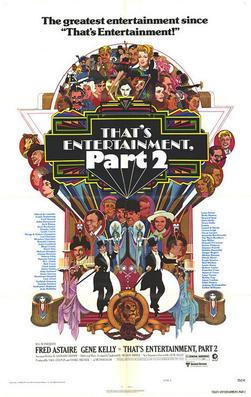
That's Entertainment, Part II is a 1976 American compilation film released by Metro-Goldwyn-Mayer and a sequel to That's Entertainment! (1974). Like the previous film, That's Entertainment, Part II was a retrospective of famous films released by MGM from the 1930s to the 1950s. Some posters for the film use Part 2 rather than Part II in the title.

Springtime in the Rockies is an American Technicolor musical comedy film released by Twentieth Century Fox in 1942. It stars Betty Grable, with support from John Payne, Carmen Miranda, Cesar Romero, Charlotte Greenwood, and Edward Everett Horton. Also appearing were Grable's future husband Harry James and his band. The director was Irving Cummings. The screenplay was based on the short story "Second Honeymoon" by Philip Wylie.
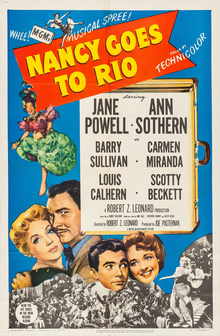
Nancy Goes to Rio is a 1950 American Technicolor musical-comedy film directed by Robert Z. Leonard and produced by Joe Pasternak from a screenplay by Sidney Sheldon, based on a story by Jane Hall, Frederick Kohner, and Ralph Block. The music was directed and supervised by George Stoll and includes compositions by George and Ira Gershwin, Giacomo Puccini, Jack Norworth, and Stoll.

The Girl Most Likely is a 1958 American musical comedy film about a young woman who becomes engaged to three men at the same time. The film, a remake of Tom, Dick and Harry (1941), was directed by Mitchell Leisen, and stars Jane Powell, Cliff Robertson, and Keith Andes. The choreography is by Gower Champion.

Week-End in Havana is a 1941 20th Century Fox Technicolor musical film directed by Walter Lang and starring Alice Faye and Carmen Miranda. It was the second of three pictures the two stars made together and the second Faye film to have a Latin-American theme, typical of Fox musicals of the early 1940s. Faye was pregnant during filming.

Selena Royle was an American actress of stage, radio, television and film and later, an author.
The Chez Paree was a Chicago nightclub known for its glamorous atmosphere, elaborate dance numbers, and top entertainers. It operated from 1932 until 1960 in the Streeterville neighborhood of Chicago at 610 N. Fairbanks Court. The club was the epitome of the golden age of entertainment, and it hosted a wide variety of performers, from singers to comedians to vaudeville acts. A "new" Chez Paree opened briefly in the mid-1960s on 400 N. Wabash Avenue and was seen in the film Mickey One with Warren Beatty.
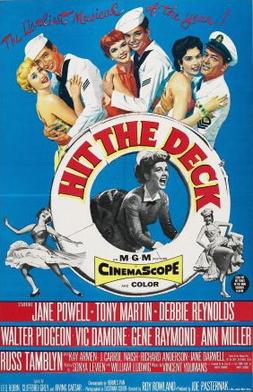
Hit the Deck is a 1955 American musical film directed by Roy Rowland and starring Jane Powell, Tony Martin, Debbie Reynolds, Walter Pidgeon, Vic Damone, Gene Raymond, Ann Miller, and Russ Tamblyn. It is based on the 1927 stage musical of the same name – which was itself based on the hit 1922 play Shore Leave by Hubert Osborne – and was shot in CinemaScope. Although the film featured some songs from the stage musical, the plot was different. Standards featured in the film include "Sometimes I'm Happy", "I Know that You Know", and "Hallelujah".

Honeymoon, also shown as The Lovers of Teruel in the United States, is a 1959 film by the British director-writer Michael Powell based in part on the ballet El Amor Brujo by Manuel de Falla. The film stars Anthony Steel, Ludmilla Tchérina and Spanish ballet dancer Antonio, and features Léonide Massine.

Holiday in Mexico is a 1946 America Technicolor musical comedy film directed by George Sidney and starring Walter Pidgeon, Jane Powell, and Ilona Massey. It was produced by Metro-Goldwyn-Mayer and marked Powell's first film for the Hollywood studio who had placed her under contract.






